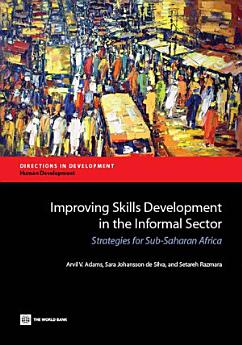Improving Skills Development in the Informal Sector: Strategies for Sub-Saharan Africa
Jul 2013 · World Bank Publications
Ebook
292
Pages
reportRatings and reviews aren’t verified Learn More
About this ebook
The informal sector of Sub-Saharan Africa is comprised of small and household enterprises that operate in the non-farm sector outside the protected employment of the formal wage sector. The sector was identified 40 years ago by the ILO representing a pool of surplus labor that was expected to be absorbed by future industrialization, but rather than gradually disappearing, it has become a persistent feature of the region s economic landscape accounting for a majority of jobs created off the farm. Acknowledging its potential as a source of employment for the region s expanding workforce and improving its productivity and earnings is recognized as a priority for poverty reduction. This study examines the role played by education and skills development in achieving this objective. Until now, few studies have used household labor force surveys to capture the skills profile of the informal sector and study how different means of skills development formal education, technical and vocational education and training, apprenticeships, and learning on the job -- shape productivity and earnings in the informal sector as compared with the formal wage sector. This study uses household labor force surveys to look at the experience of skills development in five African countries Ghana, Kenya, Nigeria, Rwanda, and Tanzania that together account for one-third of the nearly 900 million persons living in SSA. The study defines the non-farm informal sector as the self-employed (own account and with workers), contributing family members, and wage workers in small and household enterprises. Of the nearly 36 million working off the farm in the five countries, 7 out of 10 are working in the informal sector. The importance of this study is its quantitative assessment of how different sources of skills development are related to the sector in which one works and the earnings received in that sector. It further highlights a set of economic constraints to acquiring skills in the small and household enterprises of the informal sector that will have to be overcome if skills are to become a means for improving productivity and earnings in this sector. The study offers a comprehensive strategy for improving employment outcomes in the informal sector through skills development with examples of successful interventions taken from international experience and the five countries.
Rate this ebook
Tell us what you think.
Reading information
Smartphones and tablets
Install the Google Play Books app for Android and iPad/iPhone. It syncs automatically with your account and allows you to read online or offline wherever you are.
Laptops and computers
You can listen to audiobooks purchased on Google Play using your computer's web browser.
eReaders and other devices
To read on e-ink devices like Kobo eReaders, you'll need to download a file and transfer it to your device. Follow the detailed Help Center instructions to transfer the files to supported eReaders.






